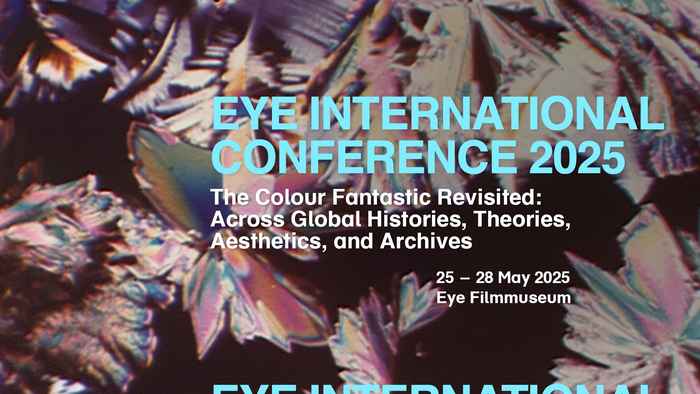The Colour Fantastic Revisited: Across Global Histories, Theories, Aesthetics, and Archives
- Start date
- 25 May 2025
- End date
- 28 May 2025

2025 marks thirty years since the ground-breaking Amsterdam workshop Disorderly Order: Colours in Silent Film, which brought together specialists from a variety of disciplines to explore contemporary archival and academic debates on the topic. It was this workshop that inspired the creation of the Eye International Conference, and in 2015, we revived the topic under the title The Colour Fantastic: Chromatic Worlds of Silent Cinema. Furthermore, the first Colour in Film event was organised in 2015 by the Colour Group GB and the Hochschule für Technik und Wirtschaft (HTW) Berlin, leading to a series of eight international conferences during its first decade.
Since its first edition, the Eye International Conference has grown into a key event in the field, bringing together researchers and professionals working with, on, and in archives from across the globe. With this vision, the Conference now turns back to its inaugural topic, colour, to explore the current themes and emergent challenges in the field across academic and professional realms, throughout film history. In the wake of the recent volume Global Film Colour (ed. S. Street and J. Yumibe, 2024), and joining forces with the latest edition of the Colour in Film Conference, we seek to amplify research, practices, questions, and challenges from around the globe, specifically the under-represented geographies in the growing scholarship on film colour.
The programme committee invites contributions from a wide array of researchers and professionals across various affiliations, career stages, and geographies working with film colour. We particularly invite critical approaches to film colour across Archival Studies and Film Studies perspectives. We seek to bridge these two realms, by probing the ways in which the archives inform film theory, history, and aesthetics as well as the ways in which film knowledge informs archival practices, such as preservation, restoration, presentation, and curation. We call for proposals that address how these both seemingly disparate realms inform, shape, translate, and challenge each other.
Taking inspiration from a key volume in the field, i.e. Colour and the Moving Image: History, Theory, Aesthetics, Archive (ed. Simon Brown et al, 2013), we suggest the following “streams” as approaches to the study of film colour globally, within and beyond the silent film era. These streams are not mutually exclusive; instead they chart out main currents in the field and we are equally interested in their interactions, cross-flows, and undercurrents. The potential questions and topics listed here are neither exhaustive nor limiting, but meant as inspiration. We encourage proposals from around the globe especially from participants, archives, regions, and topics that are underrepresented in conferences related to audiovisual heritage.
Stream: History
This stream addresses the questions of history and historiography of film colour, including but not limited to:
- Developments, disruptions, discontinuities of film colour technologies and practices
- Historiography of film colour
- Absences and gaps in the histories of film colour
- Hegemonic and marginalised film histories of colour
- The exchange and adaptation of colour technologies across borders and global trade routes.
- Colour science and restoration technology
Stream: Theory
Focusing on the questions and challenges of theory across technological, filmic, and archival domains, this stream explores the following topics:
- The scientific theories that inform film colour
- How does film theory respond to film colour? Tracing film colour in the canonical or marginalised film theoretical texts. How did film colour change/transform/challenge film theory?
- Filmmakers working with or refusing film colour based on a theoretical starting point
Stream: Aesthetics
Building on an understanding of ‘aesthetics’ as the order of the sensible, this stream explores the aesthetic functions of film colour:
- Film colour as sensory experience
- Politics of film colour aesthetics
- The intersections of colour and race in cinema
- Aesthetics across the globe
- Curation of colour film
- Informing visual aesthetics through film technologies
- Uses of colour in activist/radical filmmaking practices
- Experimental, small-gauge film colour
Stream: Archive
This stream draws from and feeds into all the above streams by centering the key role of archival institutions in informing film history, theory, and aesthetics. It explores current and emergent challenges in archives related to the rich histories and technologies of film colour:
- Restoration challenges, practices, and technologies (inc. DIY solutions)
- Use of multiple sources, formats, versions in colour restoration
- Colourisation, including AI scaling
- Transformation of archival processes in the shift from analogue to digital formats
- Challenges to the archival field
- How do archives contribute to the history, theory and aesthetics of film colour
Schedule
The Eye International Conference 2025 will take place in Amsterdam, from Sunday 25 May to Wednesday 28 May 2025. Wednesday 28th May consists of an Open House at the Eye Collection Centre, a programme of guided tours, presentations, demonstrations and discussions.
Programme committee
- Eleni Tzialli (Eye)
- Elif Rongen-Kaynakçi (Eye)
- Meike Bartlema (Eye)
- Giovanna Fossati (Utrecht University)
- Asli Özgen-Havekotte (UvA)
- Floris Paalman (UvA)
Advisory Board
- Kaveh Askari (Michigan State University)
- Sreya Chatterjee (HTW Berlin)
- Rafael de Luna (Universidade Federal Fluminense)
- Ulrich Rüdel (Colour in Film/HTW Berlin)
- Sarah Street (University of Bristol)
- Elza Tantcheva (Colour in Film/The Colour Group (GB))
- Joshua Yumibe (Michigan State University)
This event is organised by Eye Filmmuseum with the University of Amsterdam (UvA) and Utrecht University, in collaboration with Colour in FIlm. It is supported by Amsterdam School for Cultural Analysis (ASCA), Amsterdam School for Heritage, Memory and Material Culture (AHM) and Netherlands Institute for Cultural Analysis (NICA).
For more information: www.eyefilm.nl/conference, email: conference@eyefilm.nl